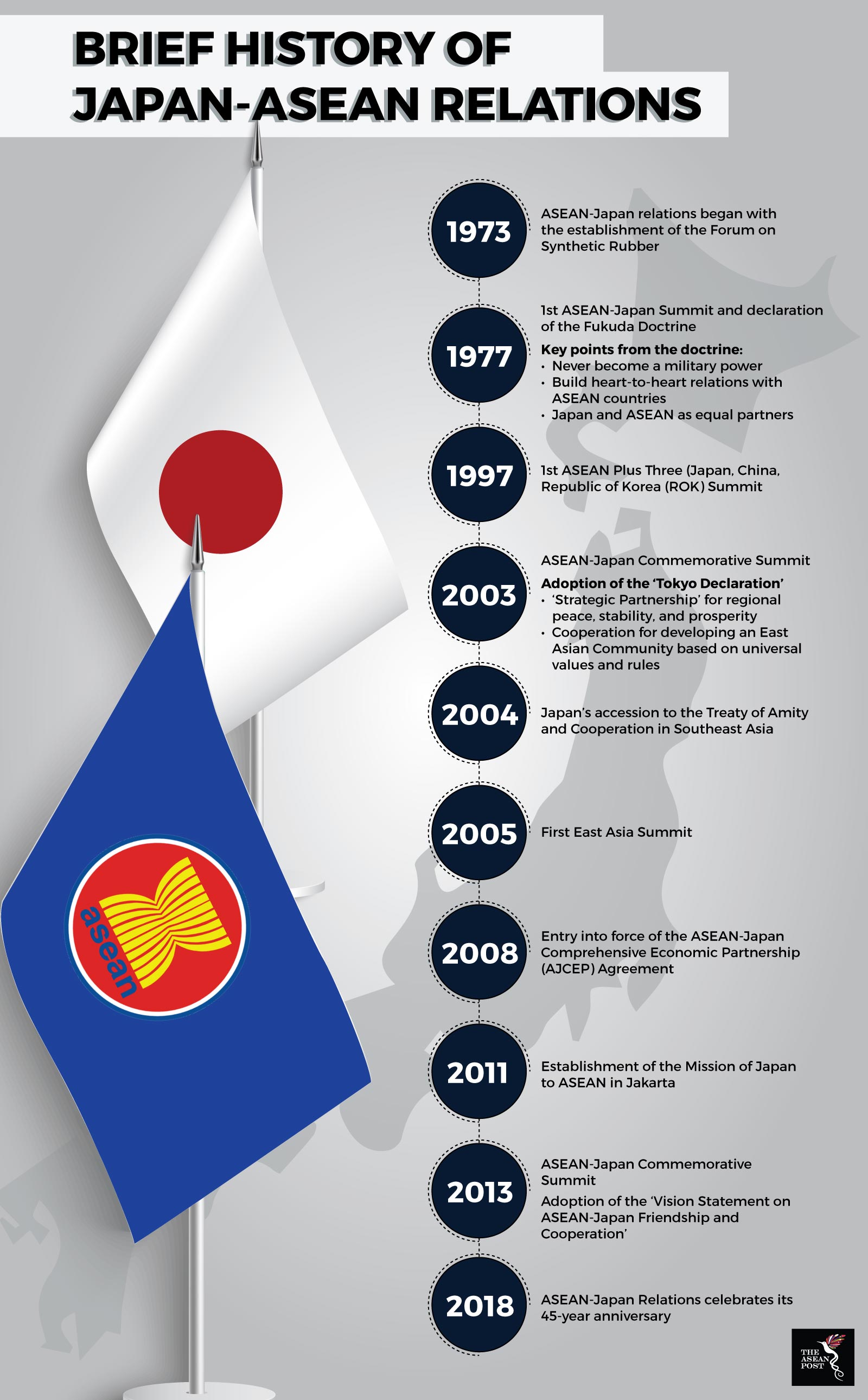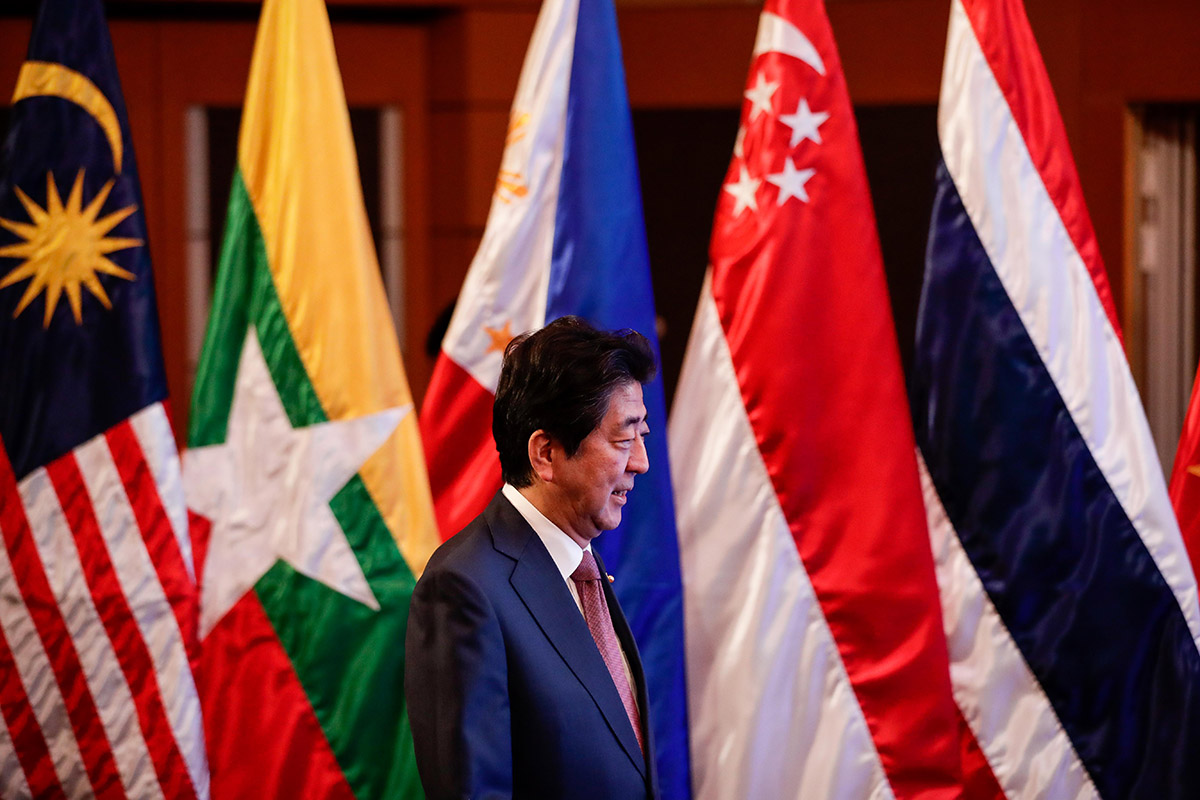As Japan and ASEAN celebrate a bond that is now in its 45th year, the historical foundations and possible benefits of such a partnership ought to be grasped and valued. Japan has always been an important external partner for ASEAN, especially after the establishment of informal dialogue relations in 1973, which was then formalised in 1977. In fact, Japan has been one country that has expressed prolonged support for ASEAN as an institution. It has worked closely with all ASEAN member states, at bilateral and multilateral levels. Since the late 1970s, Japan has been an ardent advocate of ASEAN’s centrality. From then on, substantial progress has been made in various areas of political security, economic-finance, and socio-cultural cooperation.

Source: Kazuo Sunaga, Ambassador of Japan to ASEAN
Matters of security
In a research essay by Dr Bhubhindar Singh of the S. Rajaratnam School of International Studies, the bilateral relationship between Japan and ASEAN has seen growth with its security dimensions expanding since the 2000s, specifically under Shinzō Abe. During his tenure, Southeast Asia has transformed into a special sub-region with critical strategic importance for Japan’s foreign policy strategy.
In the current political climate, Japan’s links with ASEAN is pivotal. The Land of the Rising Sun is facing constant pressure from the Asian colossus that is China, leaving Tokyo feeling rather uneasy. This is no exaggeration as China’s assertive policies over both, the East and South China Sea have left a sour taste in the mouths of those who are affected, including ASEAN claimants to parts of the latter. Japan and ASEAN will have to work together to minimise this apparent stranglehold.
Japan’s irritation with China can also be linked to an announcement of an air defence identification zone in November 2013 which is deemed to be an infringement upon the freedom of flight in international airspace near the Senkaku Islands. Not only that, repeated intrusions into Japanese controlled waters and airspace is a cause for concern.
For Japan, the impact of structural forces has resulted in a greater clarification of its national security strategy. It has become an engaged security actor – a critical player in contesting China’s unwarranted disruption of Southeast Asia and its peripheries. Tokyo has made the decision to solidify security partnerships with the Philippines and Vietnam, both claimant countries in the South China Sea imbroglio.
Economic implications
From a financial standpoint, Japan is attracted by ASEAN’s market openness, with trade and investment liberalisation in the region an undeniable pull factor. Japanese investors are allocating more capital for Southeast Asia, even as foreign direct investment (FDI) flows to the ASEAN-6 countries have seen a huge leap; averaging US$20 billion per year for the past five years. Moreover, according to the Japan Bank for International Cooperation, approximately 56% of Japanese firms look to expand their business to ASEAN in the coming years, especially in the markets of Vietnam, Indonesia, and Thailand. Although the costs of carrying out business remain high in the region, it is not a crippling constraint for Japanese investors.
The ASEAN-Japan 10-year Strategic Economic Cooperation Roadmap is a framework that has led to the lucrative economic reality that both partners appreciate to this day. The blueprint was endorsed at the 18th AEM-METI (Ministry of Economy, Trade and Industry) Consultations on 30 August, 2012. It is aimed at doubling the trade and investment flows of ASEAN and Japan by 2020. The advancement of small-and-medium enterprises (SMEs) and cooperatives, the upholding of economic legal outlines, the improvement of healthcare and education, as well as progress in information and communication technologies are among the noticeable benefits of the partnership.
As a whole, the partnership between Japan and ASEAN has seen tremendous positives over the years. Through mutual respect and a desire to propel forward in numerous areas, it is not far-fetched to say that this bond will stand the test of time.
